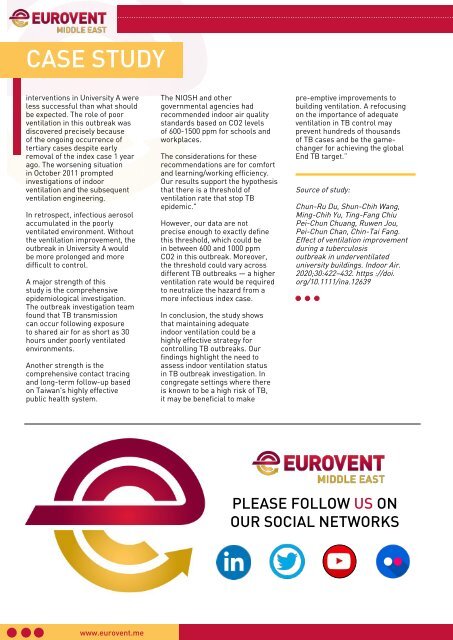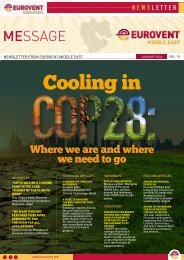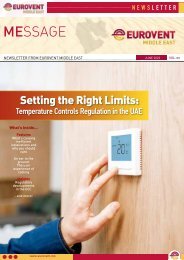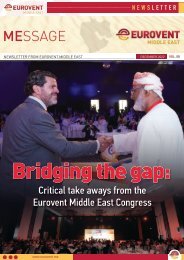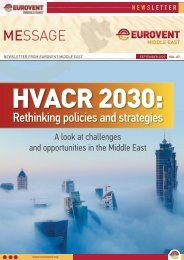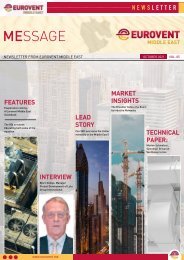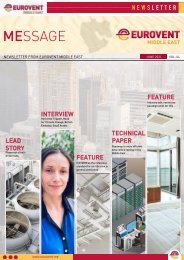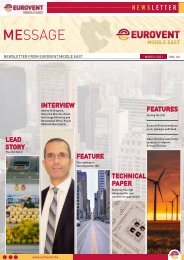EME Newsletter MEssage #1/2022
HVACR Industry news from Eurovent Middle East
HVACR Industry news from Eurovent Middle East
Create successful ePaper yourself
Turn your PDF publications into a flip-book with our unique Google optimized e-Paper software.
NEWSLETTER<br />
CASE STUDY<br />
interventions in University A were<br />
less successful than what should<br />
be expected. The role of poor<br />
ventilation in this outbreak was<br />
discovered precisely because<br />
of the ongoing occurrence of<br />
tertiary cases despite early<br />
removal of the index case 1 year<br />
ago. The worsening situation<br />
in October 2011 prompted<br />
investigations of indoor<br />
ventilation and the subsequent<br />
ventilation engineering.<br />
In retrospect, infectious aerosol<br />
accumulated in the poorly<br />
ventilated environment. Without<br />
the ventilation improvement, the<br />
outbreak in University A would<br />
be more prolonged and more<br />
difficult to control.<br />
A major strength of this<br />
study is the comprehensive<br />
epidemiological investigation.<br />
The outbreak investigation team<br />
found that TB transmission<br />
can occur following exposure<br />
to shared air for as short as 30<br />
hours under poorly ventilated<br />
environments.<br />
Another strength is the<br />
comprehensive contact tracing<br />
and long-term follow-up based<br />
on Taiwan's highly effective<br />
public health system.<br />
The NIOSH and other<br />
governmental agencies had<br />
recommended indoor air quality<br />
standards based on CO2 levels<br />
of 600-1500 ppm for schools and<br />
workplaces.<br />
The considerations for these<br />
recommendations are for comfort<br />
and learning/working efficiency.<br />
Our results support the hypothesis<br />
that there is a threshold of<br />
ventilation rate that stop TB<br />
epidemic."<br />
However, our data are not<br />
precise enough to exactly define<br />
this threshold, which could be<br />
in between 600 and 1000 ppm<br />
CO2 in this outbreak. Moreover,<br />
the threshold could vary across<br />
different TB outbreaks — a higher<br />
ventilation rate would be required<br />
to neutralize the hazard from a<br />
more infectious index case.<br />
In conclusion, the study shows<br />
that maintaining adequate<br />
indoor ventilation could be a<br />
highly effective strategy for<br />
controlling TB outbreaks. Our<br />
findings highlight the need to<br />
assess indoor ventilation status<br />
in TB outbreak investigation. In<br />
congregate settings where there<br />
is known to be a high risk of TB,<br />
it may be beneficial to make<br />
pre-emptive improvements to<br />
building ventilation. A refocusing<br />
on the importance of adequate<br />
ventilation in TB control may<br />
prevent hundreds of thousands<br />
of TB cases and be the gamechanger<br />
for achieving the global<br />
End TB target.”<br />
Source of study:<br />
Chun-Ru Du, Shun-Chih Wang,<br />
Ming-Chih Yu, Ting-Fang Chiu<br />
Pei-Chun Chuang, Ruwen Jou,<br />
Pei-Chun Chan, Chin-Tai Fang.<br />
Effect of ventilation improvement<br />
during a tuberculosis<br />
outbreak in underventilated<br />
university buildings. Indoor Air.<br />
2020;30:422–432. https ://doi.<br />
org/10.1111/ina.12639<br />
Why Middle East should<br />
incentivise ventilation<br />
retrofits<br />
The pandemic has shown how dependent our life and businesses are on our built<br />
environment. Eurovent Middle East is calling on all governments to provide incentives<br />
to retrofit existing buildings with better ventilation and air filtration systems, to avoid<br />
similar situations in future crises. The stimulus to the economy stemming from such<br />
incentives is considerable and would offset the costs.<br />
PLEASE FOLLOW US ON<br />
OUR SOCIAL NETWORKS<br />
www.eurovent.me MAY <strong>2022</strong> VOL. 01


